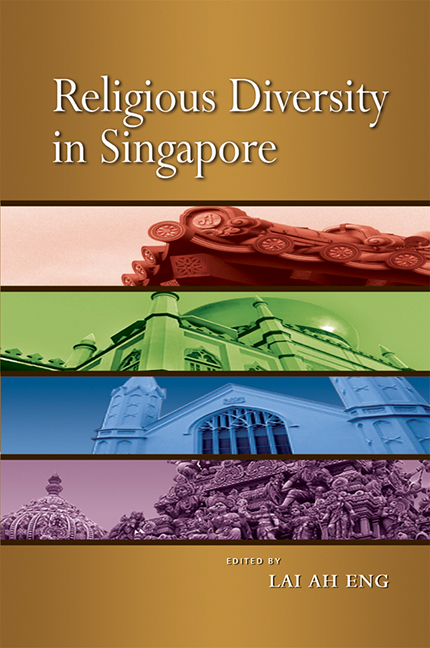Book contents
- Frontmatter
- Contents
- List of Figures and Tables
- List of Appendices
- FOREWORD
- PREFACE
- Acknowledgements
- The Contributors
- Abbreviations
- Glossary
- INTRODUCTION
- PART I The Landscape of Religious Diversity
- PART II Religion in Schools and Among the Young
- PART III Religion in the Media
- PART IV Religious Organizations in Social Services
- 19 Muslim Organizations and Mosques as Social Service Providers
- 20 Hindu Temples in Charities and Social Services
- 21 Delivering Welfare Services in Singapore: A Strategic Partnership between Buddhism and the State
- 22 Saving the City through Good Works: Christian Involvement in Social Services
- PART V Interfaith Issues and Interaction
- Index
21 - Delivering Welfare Services in Singapore: A Strategic Partnership between Buddhism and the State
from PART IV - Religious Organizations in Social Services
Published online by Cambridge University Press: 21 October 2015
- Frontmatter
- Contents
- List of Figures and Tables
- List of Appendices
- FOREWORD
- PREFACE
- Acknowledgements
- The Contributors
- Abbreviations
- Glossary
- INTRODUCTION
- PART I The Landscape of Religious Diversity
- PART II Religion in Schools and Among the Young
- PART III Religion in the Media
- PART IV Religious Organizations in Social Services
- 19 Muslim Organizations and Mosques as Social Service Providers
- 20 Hindu Temples in Charities and Social Services
- 21 Delivering Welfare Services in Singapore: A Strategic Partnership between Buddhism and the State
- 22 Saving the City through Good Works: Christian Involvement in Social Services
- PART V Interfaith Issues and Interaction
- Index
Summary
INTRODUCTION
The Buddhist temple is now considered an important provider of welfare services. The cultural politics of religion is such that while the temple sees its welfare roles as strictly belonging to the moral dictum of its teachings, the state sees the temple as a legitimate space where the group of temple-goers can be convinced to take on welfare roles. Through a series of Land Law and planning policies, the state has indirectly transformed the role of the temple into an important welfare provider. In this sense, a religious space is partially turned into a secular space for the less privileged groups of people within Singapore society. The temple can thus been seen as a champion of the underclass, assuming moral authority over the citizenry albeit under the directive of the Singapore state.
This chapter explores the relationship between Buddhism and state in the delivery of welfare services in contemporary Singapore. It examines the intersection between the Singapore state's ideology and Buddhist ideology to produce a philanthropic Buddhist landscape that encourages Buddhist organizations and individuals to become actively involved in charity works. In particular, they undertake to provide social and welfare services to the socially disadvantaged groups.
The development of the temple as a provider of welfare coincides with the varying strategies implemented by the Chinese community to cope with economic and social changes within Singapore society. The strategies taken by both the temple and the Sangha (Buddhist order of monks and nuns) have therefore to be seen within this wider context.
The relationship between religion and charity has always been an intimate one. The Buddhist Sangha has, since its formation, taken on the role of a provider of charity and welfare for the less fortunate public. Much of its work in this area, because of its small scale, has generally gone unnoticed and unacknowledged by the general public, except for those who have been at the recipient end. In recent years, the Sangha and temples have formalized their work on charity works, and their work in this area is now increasingly recognized by the general public and the state.
- Type
- Chapter
- Information
- Religious Diversity in Singapore , pp. 505 - 523Publisher: ISEAS–Yusof Ishak InstitutePrint publication year: 2008



